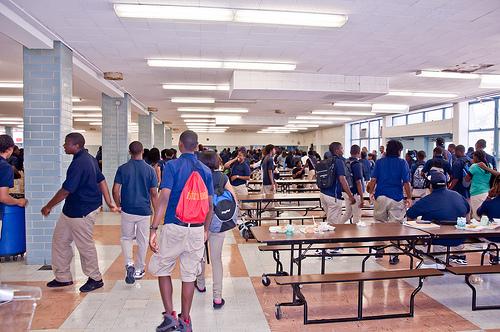Detention and suspension rates in Chicago increase during end of month period, may be related to food stamps
Students eat lunch in the cafeteria at Ballou Senior High School in Washington, D.C. (Photo from Flickr user reed-sandridge.)
A study of public schools in Chicago shows that rates of detention and suspension of students on government food-aid programs increase during the last days of the month.
The problem, new research shows, may be linked to a lack of nutrition as federal food stamp funding runs out for families.
According to a Bloomberg article, research by Jesse Shapiro, a University of Chicago economist, shows, “caloric intake among food-stamp beneficiaries is 10 percent to 15 percent lower, on average, at the end of the month than at the beginning.” Lisa Gennetian, managing director of Ideas42, said the study started as an attemt to study the lives of “the poor.”
“And this observation that without having any savings, often no … financial slack, except for very high cost alternatives such as payday loans, that we’re putting a lot of pressures on the poor to also make … good decision(s),” Gennetian said.
Recent data suggest living on minimum wage may not be possible in the United States. Poverty has also frequently been linked to crime, though some question the causality of the link.
“So this work actually came out of not because we were specifically interested in food policy, but this observation that the demands of day-to-day living when you have very low income, leave little room for error, especially the error that might have financial implications and,” Gennetian said.
Despite the correlation between the rates of punishment in public schools and caloric intake, Gennetian said their data was limited and unable to conclusively determine the the cause of increased detentions and suspensions.
“Certainly hunger is one hypothesis. In our analysis, when we look at the children in the Chicago public schools who also have an after-school program, the increases of the detentions and suspensions is attenuated a bit,” Gennetian said. “So it looks like, or it might be, that hunger could be one mechanism, but another one … could simply be that the stresses at the end of the month of making ends meet, are manifesting themselves in parenting, disengaging with children, and that, in addition, could lead to lots of acting out behavior in school.”
Patti Haasch, principal of Cass Lake-Bena Elementary School in Cass Lake, Minn., said her school, which teaches kindergarten through fourth grade, has a free breakfast and lunch program for all of its students, even though only 80 percent qualify under federal guidelines for free and reduced meals. She said it is harder for families on food programs to plan ahead for the end of the month and manage money because of their circumstances.
“And I think (Gennetian) mentioned about people having the stresses in their lives. They’re not thinking in the same way as someone who does have proper nutrition and means of providing for their family,” Haasch said.
Haasch said staff who are aware of students lacking food at home occasionally give them food to take home. However, her school is an exception. Statistics show a relatively low number of students are eligible for free meal programs.
Our coverage reaches millions each week, but only a small fraction of listeners contribute to sustain our program. We still need 224 more people to donate $100 or $10/monthly to unlock our $67,000 match. Will you help us get there today?
